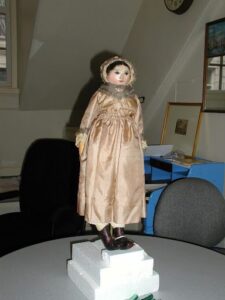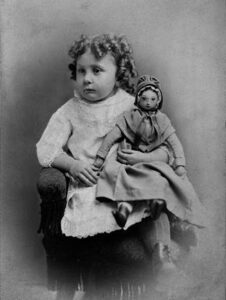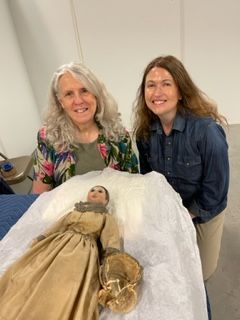
Meet Polly: The Polly Sumner Doll Reproduction Project, Part 1

Written by Lori L. Erickson
 One of Revolutionary Spaces’ most treasured collections objects is a beautiful, 250-year-old doll affectionately named the Polly Sumner doll. Brought over on one of the ships that would be directly involved in the Boston Tea Party, the doll was purchased in a shop right across from the Old South Meeting House.
One of Revolutionary Spaces’ most treasured collections objects is a beautiful, 250-year-old doll affectionately named the Polly Sumner doll. Brought over on one of the ships that would be directly involved in the Boston Tea Party, the doll was purchased in a shop right across from the Old South Meeting House.
In early 2022, Revolutionary Spaces received a generous gift from Richard C. Wiggin, former Executive Director of the Bostonian Society, to create a reproduction of the Polly Sumner doll. On display for a limited time starting in April 2023, she can tell her stories just in time for the 250th anniversary of the Boston Tea Party.
Brought over with the Tea
The Boston Tea Party was organized by colonists to protest what was seen as unfair taxation of tea and a monopoly by the British East India Company in the tea trade to the colonies. Dressed in disguise, some as American Indians, a group of colonists snuck aboard ships anchored in Boston Harbor under cover of night and dumped the vessels’ cargo of tea into the water.
One lesser known fact about the ships involved in that fateful act is that they carried a variety of cargo in addition to tea, such as books and toys. Among the items brought for sale was a fashion doll made of English oak and dressed in beautiful clothing, including a brocade dress and hat with ostrich feather.
Oldest Member of the Family

1939.0008
Photograph, c. 1876-1879 CE
Revolutionary Spaces – Bostonian Society
The stunning doll caught the eye of Mary (Polly) Sumner Williams of Roxbury, who purchased her from a shop across from the Old South Meeting House on the very day of the Tea Party, December 16, 1773. The cousin of Governor Increase Sumner and granddaughter of Increase Mather, Mary Sumner Williams purchased the doll for her daughters, Abigail and Mary. Not only would her children play with the doll, but the treasured toy would end up being passed down through multiple generations of the Sumner/Williams/Langley family.
The doll remained in the family for almost 150 years before finally being presented to the Bostonian Society by Mary P. Langley in 1919. Named for her original owner Polly, the unique plaything has called the Old State House home for the past one hundred years.
Polly’s Current Condition
A 250-year-old toy is bound to have some wear and tear. Although Polly has held up well for her age, she has suffered some adverse effects from the many years of play and the ravages of time.
Originally made entirely of wood, her arms and legs were replaced with horsehair-stuffed leather by an owner in the late nineteenth century. As leather ages, it loses moisture and cracks, and the leather on her arms has split apart where it was overstuffed. In addition, Polly must be kept from UV light to protect her clothing and paint from fading.
How to Keep Her Story Alive?
Her advanced years and fragile state mean that she is not a good candidate for display; but how to share this one-of-a-kind object with visitors when she can’t be part of an exhibit?
Enter former Bostonian Society Executive Director, Rick Wiggin, who saw the need to share this important historical artifact with the public while still protecting the doll. Rick suggested that, with the help of his generous donation, Revolutionary Spaces could commission an artist to make an exact replica of the doll to be displayed in her place.
The Reproduction Artist

So began the work of finding a dollmaker. In this day and age, finding an artist who specializes in carving wooden dolls by hand was no easy feat! Most were located overseas, working in Eastern European doll making traditions. Finally, Revolutionary Spaces stumbled across the website for sculptor Janet Cordell, a talented artist from Arkansas. In addition to creating wood sculptures, Janet discovered an interest in antique dolls and began carving her own versions in the 1990s.
Janet was thrilled at the idea of being involved in the reproduction project, and quickly hopped on a plane to visit Boston and meet Polly Sumner in person. She spent three days photographing and measuring the doll, as well as poring over the catalog and research files about the doll and her previous owners. Once Janet collected the information she needed, she headed back to Arkansas to begin work on the reproduction.
On Wednesday, April 19, 2023 Revolutionary Spaces will host the official book launch for Polly Sumner: Witness to the Boston Tea Party (Lawley Publishing). Learn more.

